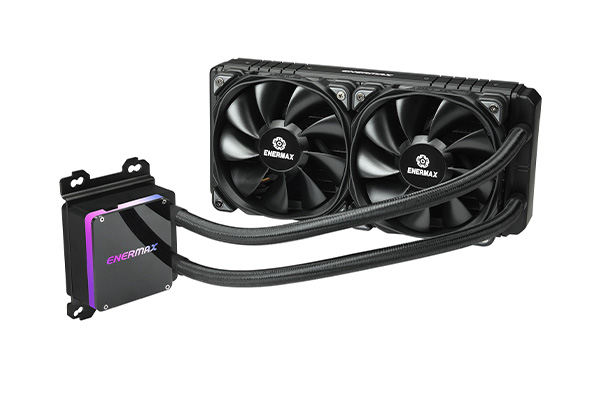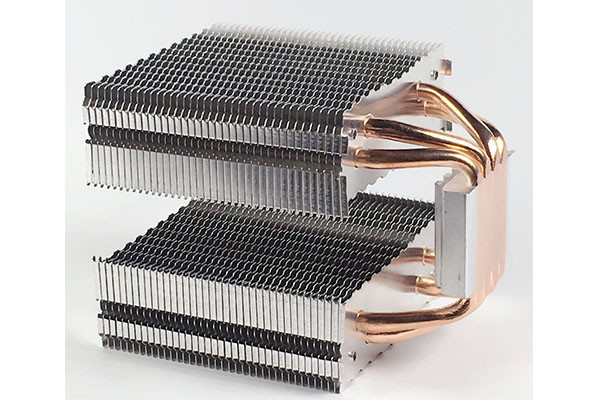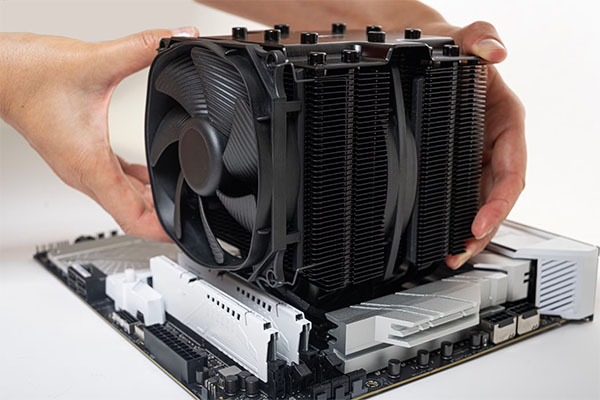Введение
Choosing the right CPU cooler is crucial for ensuring that your computer’s processor performs at its best. Whether you’re building a high-performance gaming rig or assembling a workstation for heavy tasks, selecting the appropriate cooler is one of the most important decisions you’ll make. The two most common types of CPU coolers—air coolers and liquid coolers—each offer unique advantages and limitations. In this article, we’ll dive deep into the comparison between air and liquid CPU coolers, helping you make an informed decision on which one is best suited for your needs.

1. What Are CPU Coolers?
Let’s start with the basics. What exactly is a CPU cooler, and why do you need one? Simply put, a CPU cooler is a device that helps dissipate the heat produced by your computer’s central processing unit (CPU). When your CPU works hard, it generates heat. If not dissipated properly, this heat can cause the processor to overheat, resulting in system instability, performance throttling, or even hardware damage.
But here’s the kicker—there are different types of coolers available, and each has its strengths and weaknesses. Air coolers, which use a heatsink and a fan, are the most commonly used. Liquid coolers, on the other hand, employ liquid to transfer heat away from the CPU, often delivering superior cooling performance.
What is the main difference between the two?
The main difference lies in how they dissipate heat. Air coolers rely on convection and airflow, while liquid coolers use a pump and tubes to circulate coolant through the system. Both methods have their advantages, but understanding how they work will help you make a better decision.
| Тип | Метод охлаждения | Эффективность | Size |
|---|---|---|---|
| Воздушные охладители | Air and heatsink | Умеренный | Bulkier |
| Жидкостные охладители | Liquid coolant circulation | Высокий | Compact |
2. What Are the Benefits of Air CPU Coolers?
Air coolers have been around for a long time, and they’re still widely used today. You might be wondering why that is. Well, the benefits of air coolers are clear. First off, air coolers are generally easier to install compared to liquid coolers. They don’t require pumps, tubes, or liquid, which makes them simpler for DIY builders and those who want to avoid the complexity of liquid systems.
But here’s the interesting part—air coolers are also relatively affordable. When it comes to price-to-performance ratio, air coolers offer great value, especially for entry-level or mid-tier systems. Additionally, air coolers require very little maintenance. There are no pumps to fail or coolant to leak, so once installed, they can often run without any issues for years.
When should you consider an air cooler?
Air coolers are ideal for systems where high-end cooling isn’t essential. If you’re not overclocking your CPU or don’t plan on pushing your system to its limits, an air cooler will likely suffice. Plus, with modern air coolers boasting larger heatsinks and powerful fans, their cooling performance has improved significantly in recent years.
| Плюсы | Минусы |
|---|---|
| Доступный | Larger size |
| Easy installation | Lower efficiency |
| Low maintenance | Noise at high loads |
3. What Are the Benefits of Liquid CPU Coolers?
So, what makes liquid coolers so special? Liquid coolers offer superior cooling performance, especially in systems that generate a lot of heat. Here’s the deal: liquid cooling works by circulating coolant through a loop, which absorbs heat from the CPU and transfers it to a radiator, where fans cool it down. This method allows liquid coolers to maintain lower temperatures more efficiently than air coolers, making them a top choice for high-performance builds and overclocking enthusiasts.
But wait, there’s more—liquid coolers are also more compact than air coolers. Since the radiator is typically installed at the top or front of the case, liquid coolers can be a great option for smaller form factor cases where space is limited. The ability to fit a radiator in a tight space gives liquid coolers an edge over air coolers when building compact PC setups.
When should you consider a liquid cooler?
If you plan on pushing your CPU to the limits, whether by overclocking or running demanding applications, liquid cooling will ensure that your system stays cool under pressure. Additionally, liquid coolers are a good choice for high-performance gaming PCs, workstations, or servers, where maintaining optimal temperatures is crucial.
| Плюсы | Минусы |
|---|---|
| Superior cooling performance | Requires maintenance |
| Compact and space-efficient | Potential leaks |
| Better for overclocking | Higher cost |
4. How Do Air and Liquid Coolers Compare in Terms of Cooling Efficiency?
You might be wondering—how do these coolers stack up against each other when it comes to raw cooling power? It’s no surprise that liquid coolers generally perform better than air coolers, especially under heavy load or when overclocking is involved. Liquid coolers are much more efficient at transferring heat away from the CPU, which is why they’re often found in high-end gaming rigs and workstations.
This is where it gets interesting—air coolers, while effective, can struggle to keep temperatures low when the CPU is under heavy stress. Overclocking, for example, demands a lot of power from the CPU, generating more heat. In these scenarios, liquid coolers are the superior choice.
| Эффективность охлаждения | Воздушные охладители | Жидкостные охладители |
|---|---|---|
| Overclocking Performance | Умеренный | Высокий |
| Normal CPU Load Cooling | Умеренный | Высокий |
| Best for High-Performance Builds | Низкий | Высокий |

5. Which CPU Cooler Is Quieter: Air or Liquid?
Now, let’s talk about noise. Air coolers, due to their large fans, tend to be louder than liquid coolers, especially when under load. Liquid coolers, on the other hand, are often quieter because the fans on the radiator typically operate at lower speeds.
But here’s the kicker—liquid coolers still aren’t completely silent. The pump inside the cooler can generate some noise, especially if it’s of low quality. Additionally, the fans on the radiator can become noisy at higher speeds. However, liquid coolers generally remain quieter compared to air coolers when both systems are pushed to their limits.
| Уровень шума | Воздушные охладители | Жидкостные охладители |
|---|---|---|
| Under Normal Load | Умеренный | Низкий |
| Under Heavy Load | Высокий | Умеренный |
| Quietest Setup | Низкий | Низкий |
6. What Factors Should You Consider When Choosing a CPU Cooler?
Choosing the right CPU cooler is not just about cooling power; there are several other factors that should influence your decision. For starters, you’ll want to consider the size of your case. Air coolers can be bulky, so if you’re working with a small PC case, you may want to opt for a liquid cooler.
Compatibility with your CPU socket is also important. Most coolers come with brackets for different socket types, but it’s crucial to double-check that the cooler you’re interested in fits your motherboard’s socket. Budget is another significant factor. Air coolers are generally cheaper than liquid coolers, and if you’re not planning on pushing your system to its limits, an air cooler could be a great choice without breaking the bank.
| Factors | Воздушные охладители | Жидкостные охладители |
|---|---|---|
| Price | Доступный | Дорогой |
| Case Compatibility | Larger, bulkier | Smaller, more compact |
| Overclocking Support | Умеренный | Высокий |
7. How Do Air CPU Coolers Perform in Different Environments?
Air coolers are great for entry-level and mid-range systems. They provide enough cooling power to handle everyday computing tasks without any issues. For general use, like browsing the web or watching videos, an air cooler will do the job without breaking a sweat.
But here’s the thing—air coolers can struggle in environments where high heat output is common. For example, air coolers may not perform as well in gaming PCs that need to maintain stable temperatures while running high-demand applications.
| Environment | Air Coolers Performance | Liquid Coolers Performance |
|---|---|---|
| Entry-Level Systems | Хороший | Хороший |
| High-Performance Gaming | Умеренный | Отличный |
| Workstations/Servers | Умеренный | Отличный |
8. How Do Liquid CPU Coolers Perform in Different Environments?
Liquid coolers, as mentioned, excel in high-demand environments. They can handle the heat produced by gaming PCs, workstations, and servers, making them ideal for systems that require consistent high performance. Liquid coolers are also more efficient in multi-core processors, as they can transfer heat away from the CPU more effectively than air coolers.
Какова реальная история?
Liquid coolers provide a solid solution for high-end applications. If you’re pushing your system to its limits, whether through overclocking or running resource-heavy software, liquid cooling will keep your CPU temperatures in check.
| Environment | Liquid Coolers Performance | Air Coolers Performance |
|---|---|---|
| High-Performance Gaming | Отличный | Умеренный |
| Heavy Computing Workloads | Отличный | Умеренный |
| Overclocked Systems | Отличный | Низкий |
9. Are There Any Drawbacks to Air CPU Coolers?
While air coolers are simple and effective, they come with some drawbacks. The most obvious is their size. Air coolers can be quite bulky, which can create problems for compact cases. Furthermore, because they rely on fans, they can get noisy under load, especially if you’re running a system with high power consumption.
Is this a deal-breaker?
Not necessarily. If you’re building a budget-friendly or mid-tier PC, the size and noise may not be a major concern. However, if you’re looking for a quieter, space-saving option, air coolers may not be the best choice.
| Drawbacks | Воздушные охладители |
|---|---|
| Size | Large |
| Noise | Умеренный |
| Эффективность охлаждения | Умеренный |
10. Are There Any Drawbacks to Liquid CPU Coolers?
Liquid coolers are not without their issues. The biggest concern is maintenance. Unlike air coolers, liquid coolers require regular checking for leaks and refilling of coolant. Additionally, if the pump fails, it could cause a system failure.
Готовы к самой приятной части?
Despite these issues, liquid coolers are still one of the most effective cooling solutions, especially for high-end systems.
| Drawbacks | Жидкостные охладители |
|---|---|
| Обслуживание | Высокий |
| Risk of Leaks | Умеренный |
| Расходы | Высокий |

11. Can I Overclock with Air CPU Coolers?
Overclocking requires extra cooling to ensure your CPU doesn’t overheat. Air coolers can certainly handle moderate overclocking, especially with larger heatsinks and high-quality fans. However, if you plan to push your CPU to the limits, a liquid cooler will be more effective in maintaining optimal temperatures.
What’s the catch?
Air coolers are ideal for moderate overclocking, but for extreme performance, liquid coolers are a better fit.
| Overclocking | Воздушные охладители | Жидкостные охладители |
|---|---|---|
| Moderate Overclocking | Хороший | Отличный |
| Экстремальный разгон | Умеренный | Отличный |
12. Can I Overclock with Liquid CPU Coolers?
Liquid coolers are designed to handle higher thermal loads, making them an excellent choice for extreme overclocking. If you’re looking to push your system to its limits, liquid coolers can maintain lower temperatures even when under heavy load.
Here’s why that matters
With liquid coolers, you can achieve higher overclocking potential, allowing you to unlock the full performance of your CPU without worrying about heat.
| Overclocking | Жидкостные охладители |
|---|---|
| Moderate Overclocking | Отличный |
| Экстремальный разгон | Отличный |
13. How Much Do Air and Liquid CPU Coolers Cost?
Cost is always a consideration. Air coolers tend to be more affordable, with prices ranging from $20 to $100 depending on the model. Liquid coolers, on the other hand, can be significantly more expensive, with prices ranging from $50 to $200 or more.
What’s the bottom line?
While liquid coolers offer superior performance, air coolers provide great value for money, especially for lower-end systems.
| Cost Range | Воздушные охладители | Жидкостные охладители |
|---|---|---|
| Entry-Level Systems | $20–$50 | $50–$100 |
| High-End Systems | $50–$100 | $100–$200+ |
14. Which CPU Cooler Is Easier to Install: Air or Liquid?
Air coolers are generally easier to install, especially for beginners. Liquid coolers require a bit more expertise, particularly when installing the radiator and ensuring that the pump works correctly.
Почему это важно?
If you’re new to building PCs or want a simpler setup, an air cooler is your best bet. Liquid coolers, though efficient, require more effort during installation.
| Ease of Installation | Воздушные охладители | Жидкостные охладители |
|---|---|---|
| Сложность установки | Легкий | Умеренный |
| Setup Time | Quick | Time-Consuming |
15. How Do I Maintain and Clean My CPU Cooler?
Proper maintenance is crucial for keeping your cooler in top shape. Air coolers require occasional cleaning of the heatsink and fan to remove dust buildup. Liquid coolers need regular checks for leaks, and the coolant may need to be refilled over time.
What’s the takeaway here?
Maintenance is minimal for air coolers, but if you’re using a liquid cooler, ensure that you stay on top of maintenance to avoid issues down the line.
| Обслуживание | Воздушные охладители | Жидкостные охладители |
|---|---|---|
| Cleaning Frequency | Низкий | Умеренный |
| Risk of Leaks | Низкий | Высокий |
Заключение
In this comparison of air vs. liquid CPU coolers, we’ve explored the benefits, drawbacks, and performance of each. Ultimately, the right choice depends on your needs—whether you’re looking for an affordable solution, a quiet option, or a high-performance cooler for overclocking. If you’re building a budget or mid-range PC, air coolers offer excellent value. However, for high-performance systems that demand superior cooling, liquid coolers are the better choice.

Раздел часто задаваемых вопросов
В1: Что такое процессорный кулер?
A CPU cooler is a device used to prevent your computer’s processor from overheating. It dissipates heat generated by the CPU, ensuring the processor runs at optimal temperatures for better performance and longevity.
В2: How does liquid cooling work for a CPU?
Liquid cooling works by circulating a coolant through a closed loop. The coolant absorbs heat from the CPU, then moves through a radiator, where fans cool it down before it returns to the CPU, maintaining low temperatures for better performance.
В3: Which cooler is best for gaming PCs, air or liquid?
Liquid coolers are generally better for gaming PCs, especially when overclocking is involved. They provide superior cooling performance, which is crucial for maintaining stable temperatures under heavy load, such as in high-end gaming scenarios.
В4: How long do air coolers last compared to liquid coolers?
Air coolers tend to last longer since they require less maintenance and don’t involve parts like pumps or coolant, which can wear out over time. Liquid coolers, while efficient, may need more regular maintenance and could fail sooner if not properly maintained.
В5: Can I install an air cooler in a small PC case?
Yes, but you’ll need to check that the cooler fits within the dimensions of your case. Some air coolers are large and may not fit in compact builds, making liquid coolers a better choice for space-constrained setups.

